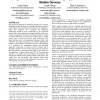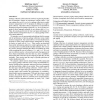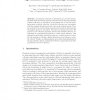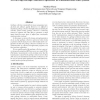135
click to vote
MOBICOM
2004
ACM
15 years 8 months ago
2004
ACM
The progress of mobile device technology unfolds a new spectrum of applications that challenges conventional infrastructure models. Most of these devices are perceived by their us...
121
click to vote
OOPSLA
2005
Springer
15 years 8 months ago
2005
Springer
Currently, the most adopted criterion to invoke garbage collection is heap space exhaustion. In other words, garbage collection is invoked when the heap space (either the entire s...
119
click to vote
OOPSLA
2005
Springer
15 years 8 months ago
2005
Springer
Garbage collection yields numerous software engineering benefits, but its quantitative impact on performance remains elusive. One can compare the cost of conservative garbage col...
106
click to vote
LCTRTS
2005
Springer
15 years 8 months ago
2005
Springer
Real-time garbage collection has been shown to be feasible, but for programs with high allocation rates, the utilization achievable is not sufficient for some systems. Since a hi...
143
click to vote
HIPEAC
2005
Springer
15 years 8 months ago
2005
Springer
This paper shows that Appel-style garbage collectors often make suboptimal decisions both in terms of when and how to collect. We argue that garbage collection should be done when ...
113
click to vote
CC
2005
Springer
15 years 8 months ago
2005
Springer
Abstract. Generational collectors are well known as a tool for shortening pause times incurred by garbage collection and for improving garbage collection efficiency. In this paper,...
108
click to vote
PLDI
2005
ACM
15 years 8 months ago
2005
ACM
Garbage collection offers numerous software engineering advantages, but interacts poorly with virtual memory managers. Existing garbage collectors require far more pages than the ...
126
click to vote
RTCSA
2005
IEEE
15 years 8 months ago
2005
IEEE
Garbage collection considerably increases programmer productivity and software quality. However, it is difficult to implement garbage collection both efficiently and suitably fo...
149
click to vote
ICDCS
2005
IEEE
15 years 8 months ago
2005
IEEE
Communication-induced checkpointing protocols that ensure rollback-dependency trackability (RDT) guarantee important properties to the recovery system without explicit coordinatio...
143
click to vote
VEE
2006
ACM
15 years 8 months ago
2006
ACM
During recent years, microprocessor energy consumption has been surging and efforts to reduce power and energy have received a lot of attention. At the same time, virtual executio...




